Medical Law: Abortion Debate, Moral Status, and Legal Reforms
VerifiedAdded on 2023/01/17
|26
|8964
|72
Essay
AI Summary
This essay, addressing the complexities of medical law, delves into the contentious issue of abortion and infanticide. The student examines the moral status of the fetus, exploring the arguments of philosophers like Judith Jarvis Thomson and Michael Tooley, and others. The essay analyzes the ethical considerations surrounding the deliberate termination of pregnancy and the rights of the unborn. It further investigates the legal framework in England and Wales, evaluating the current laws on abortion and suggesting potential reforms based on the analysis of philosophical viewpoints and the moral implications of abortion. The essay considers different perspectives on when life begins and the responsibilities of individuals involved in the process, including the woman's role and the fetus's rights. It also explores the concept of 'slippery slope arguments' and the implications of eugenics on abortion. Finally, the essay offers a comprehensive overview of the abortion debate, combining philosophical analysis with a focus on potential legal and ethical reforms.
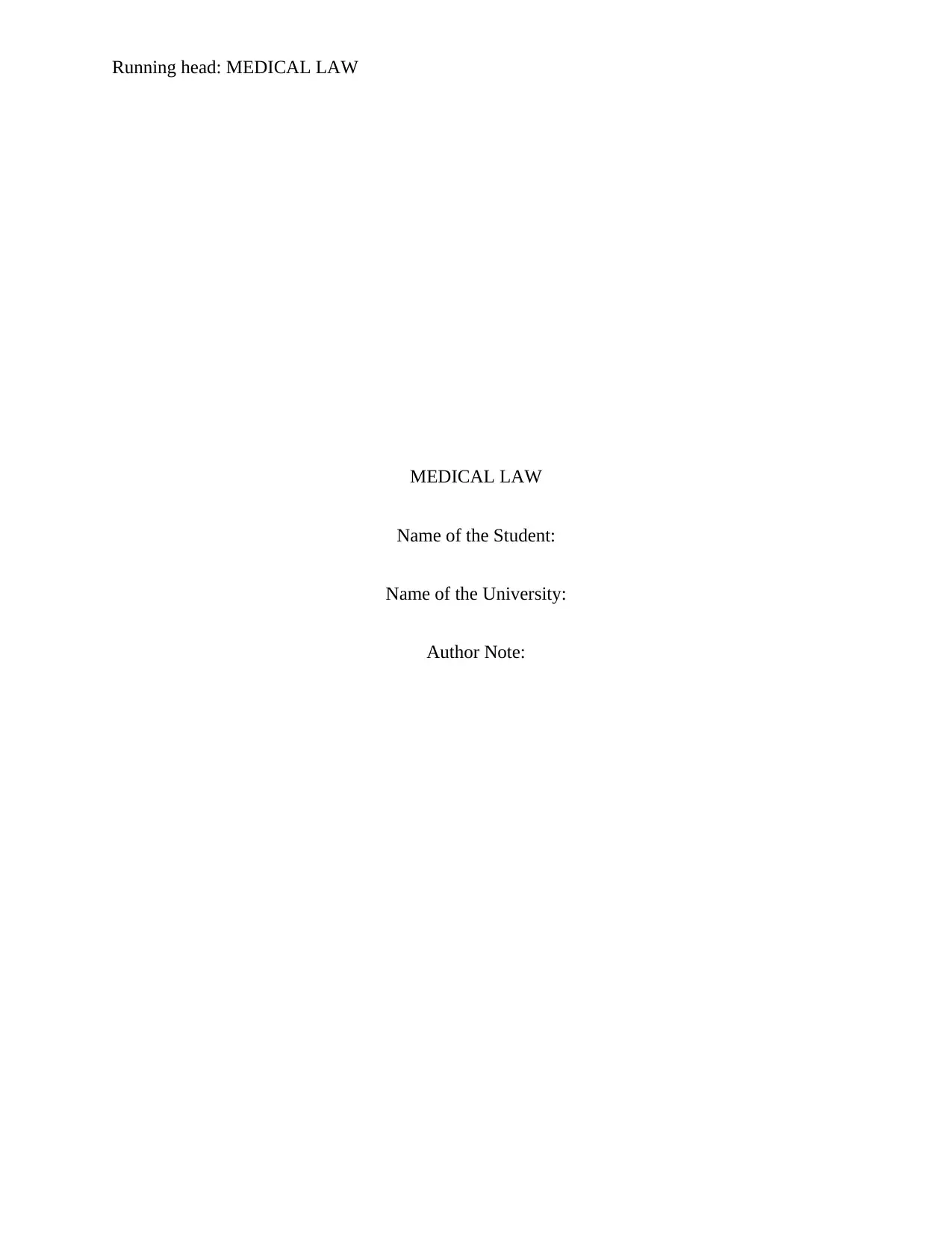
Running head: MEDICAL LAW
MEDICAL LAW
Name of the Student:
Name of the University:
Author Note:
MEDICAL LAW
Name of the Student:
Name of the University:
Author Note:
Paraphrase This Document
Need a fresh take? Get an instant paraphrase of this document with our AI Paraphraser
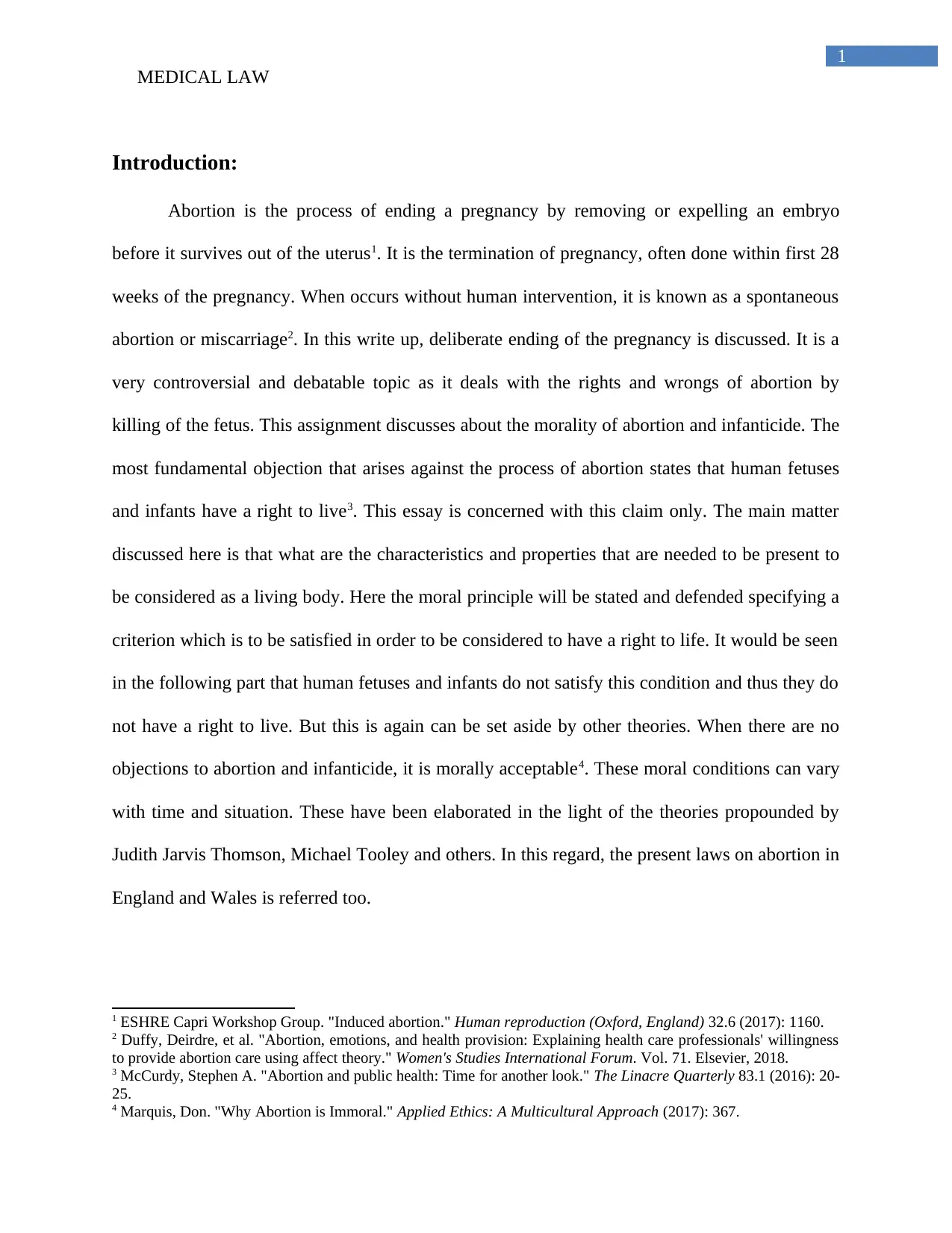
1
MEDICAL LAW
Introduction:
Abortion is the process of ending a pregnancy by removing or expelling an embryo
before it survives out of the uterus1. It is the termination of pregnancy, often done within first 28
weeks of the pregnancy. When occurs without human intervention, it is known as a spontaneous
abortion or miscarriage2. In this write up, deliberate ending of the pregnancy is discussed. It is a
very controversial and debatable topic as it deals with the rights and wrongs of abortion by
killing of the fetus. This assignment discusses about the morality of abortion and infanticide. The
most fundamental objection that arises against the process of abortion states that human fetuses
and infants have a right to live3. This essay is concerned with this claim only. The main matter
discussed here is that what are the characteristics and properties that are needed to be present to
be considered as a living body. Here the moral principle will be stated and defended specifying a
criterion which is to be satisfied in order to be considered to have a right to life. It would be seen
in the following part that human fetuses and infants do not satisfy this condition and thus they do
not have a right to live. But this is again can be set aside by other theories. When there are no
objections to abortion and infanticide, it is morally acceptable4. These moral conditions can vary
with time and situation. These have been elaborated in the light of the theories propounded by
Judith Jarvis Thomson, Michael Tooley and others. In this regard, the present laws on abortion in
England and Wales is referred too.
1 ESHRE Capri Workshop Group. "Induced abortion." Human reproduction (Oxford, England) 32.6 (2017): 1160.
2 Duffy, Deirdre, et al. "Abortion, emotions, and health provision: Explaining health care professionals' willingness
to provide abortion care using affect theory." Women's Studies International Forum. Vol. 71. Elsevier, 2018.
3 McCurdy, Stephen A. "Abortion and public health: Time for another look." The Linacre Quarterly 83.1 (2016): 20-
25.
4 Marquis, Don. "Why Abortion is Immoral." Applied Ethics: A Multicultural Approach (2017): 367.
MEDICAL LAW
Introduction:
Abortion is the process of ending a pregnancy by removing or expelling an embryo
before it survives out of the uterus1. It is the termination of pregnancy, often done within first 28
weeks of the pregnancy. When occurs without human intervention, it is known as a spontaneous
abortion or miscarriage2. In this write up, deliberate ending of the pregnancy is discussed. It is a
very controversial and debatable topic as it deals with the rights and wrongs of abortion by
killing of the fetus. This assignment discusses about the morality of abortion and infanticide. The
most fundamental objection that arises against the process of abortion states that human fetuses
and infants have a right to live3. This essay is concerned with this claim only. The main matter
discussed here is that what are the characteristics and properties that are needed to be present to
be considered as a living body. Here the moral principle will be stated and defended specifying a
criterion which is to be satisfied in order to be considered to have a right to life. It would be seen
in the following part that human fetuses and infants do not satisfy this condition and thus they do
not have a right to live. But this is again can be set aside by other theories. When there are no
objections to abortion and infanticide, it is morally acceptable4. These moral conditions can vary
with time and situation. These have been elaborated in the light of the theories propounded by
Judith Jarvis Thomson, Michael Tooley and others. In this regard, the present laws on abortion in
England and Wales is referred too.
1 ESHRE Capri Workshop Group. "Induced abortion." Human reproduction (Oxford, England) 32.6 (2017): 1160.
2 Duffy, Deirdre, et al. "Abortion, emotions, and health provision: Explaining health care professionals' willingness
to provide abortion care using affect theory." Women's Studies International Forum. Vol. 71. Elsevier, 2018.
3 McCurdy, Stephen A. "Abortion and public health: Time for another look." The Linacre Quarterly 83.1 (2016): 20-
25.
4 Marquis, Don. "Why Abortion is Immoral." Applied Ethics: A Multicultural Approach (2017): 367.
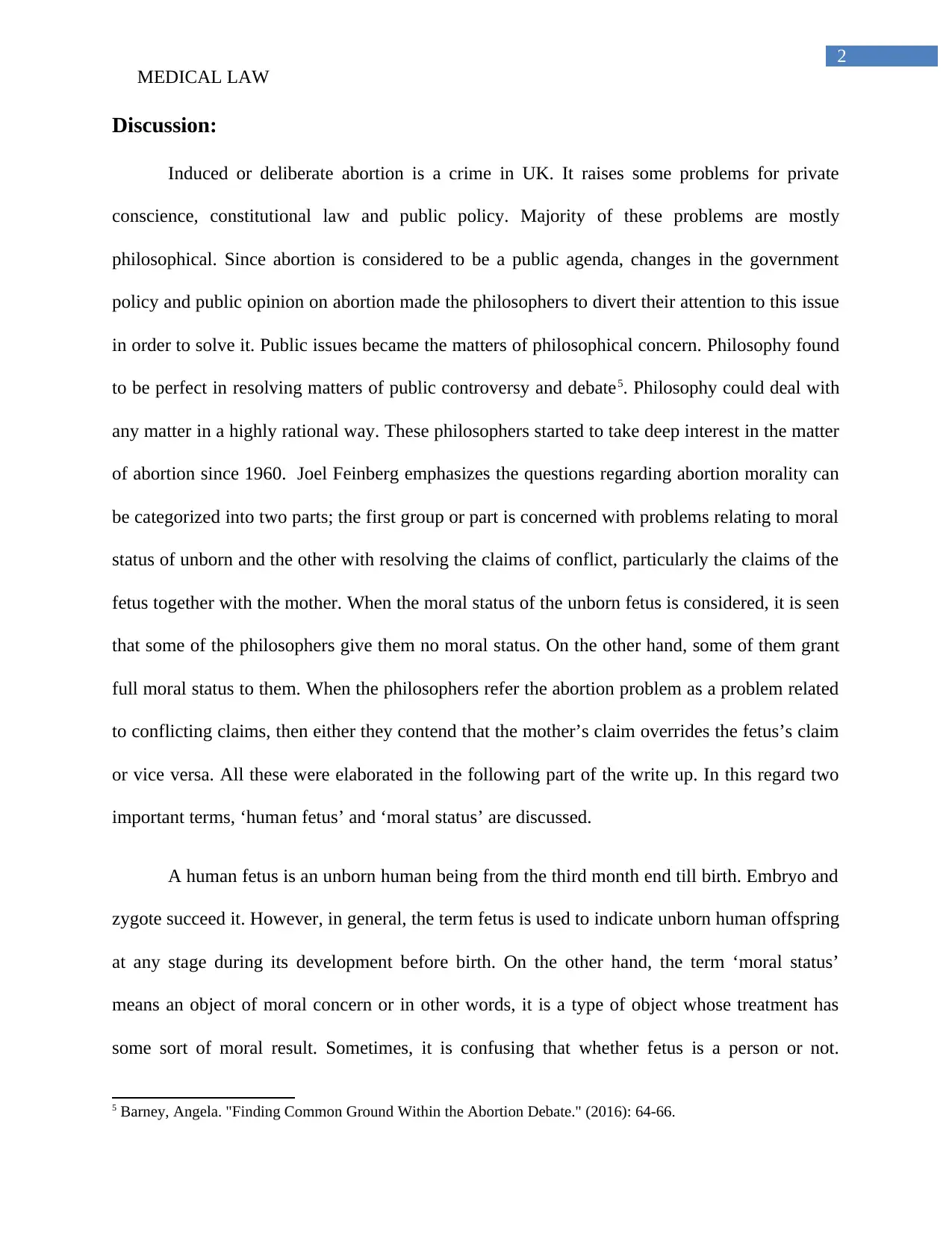
2
MEDICAL LAW
Discussion:
Induced or deliberate abortion is a crime in UK. It raises some problems for private
conscience, constitutional law and public policy. Majority of these problems are mostly
philosophical. Since abortion is considered to be a public agenda, changes in the government
policy and public opinion on abortion made the philosophers to divert their attention to this issue
in order to solve it. Public issues became the matters of philosophical concern. Philosophy found
to be perfect in resolving matters of public controversy and debate5. Philosophy could deal with
any matter in a highly rational way. These philosophers started to take deep interest in the matter
of abortion since 1960. Joel Feinberg emphasizes the questions regarding abortion morality can
be categorized into two parts; the first group or part is concerned with problems relating to moral
status of unborn and the other with resolving the claims of conflict, particularly the claims of the
fetus together with the mother. When the moral status of the unborn fetus is considered, it is seen
that some of the philosophers give them no moral status. On the other hand, some of them grant
full moral status to them. When the philosophers refer the abortion problem as a problem related
to conflicting claims, then either they contend that the mother’s claim overrides the fetus’s claim
or vice versa. All these were elaborated in the following part of the write up. In this regard two
important terms, ‘human fetus’ and ‘moral status’ are discussed.
A human fetus is an unborn human being from the third month end till birth. Embryo and
zygote succeed it. However, in general, the term fetus is used to indicate unborn human offspring
at any stage during its development before birth. On the other hand, the term ‘moral status’
means an object of moral concern or in other words, it is a type of object whose treatment has
some sort of moral result. Sometimes, it is confusing that whether fetus is a person or not.
5 Barney, Angela. "Finding Common Ground Within the Abortion Debate." (2016): 64-66.
MEDICAL LAW
Discussion:
Induced or deliberate abortion is a crime in UK. It raises some problems for private
conscience, constitutional law and public policy. Majority of these problems are mostly
philosophical. Since abortion is considered to be a public agenda, changes in the government
policy and public opinion on abortion made the philosophers to divert their attention to this issue
in order to solve it. Public issues became the matters of philosophical concern. Philosophy found
to be perfect in resolving matters of public controversy and debate5. Philosophy could deal with
any matter in a highly rational way. These philosophers started to take deep interest in the matter
of abortion since 1960. Joel Feinberg emphasizes the questions regarding abortion morality can
be categorized into two parts; the first group or part is concerned with problems relating to moral
status of unborn and the other with resolving the claims of conflict, particularly the claims of the
fetus together with the mother. When the moral status of the unborn fetus is considered, it is seen
that some of the philosophers give them no moral status. On the other hand, some of them grant
full moral status to them. When the philosophers refer the abortion problem as a problem related
to conflicting claims, then either they contend that the mother’s claim overrides the fetus’s claim
or vice versa. All these were elaborated in the following part of the write up. In this regard two
important terms, ‘human fetus’ and ‘moral status’ are discussed.
A human fetus is an unborn human being from the third month end till birth. Embryo and
zygote succeed it. However, in general, the term fetus is used to indicate unborn human offspring
at any stage during its development before birth. On the other hand, the term ‘moral status’
means an object of moral concern or in other words, it is a type of object whose treatment has
some sort of moral result. Sometimes, it is confusing that whether fetus is a person or not.
5 Barney, Angela. "Finding Common Ground Within the Abortion Debate." (2016): 64-66.
⊘ This is a preview!⊘
Do you want full access?
Subscribe today to unlock all pages.

Trusted by 1+ million students worldwide
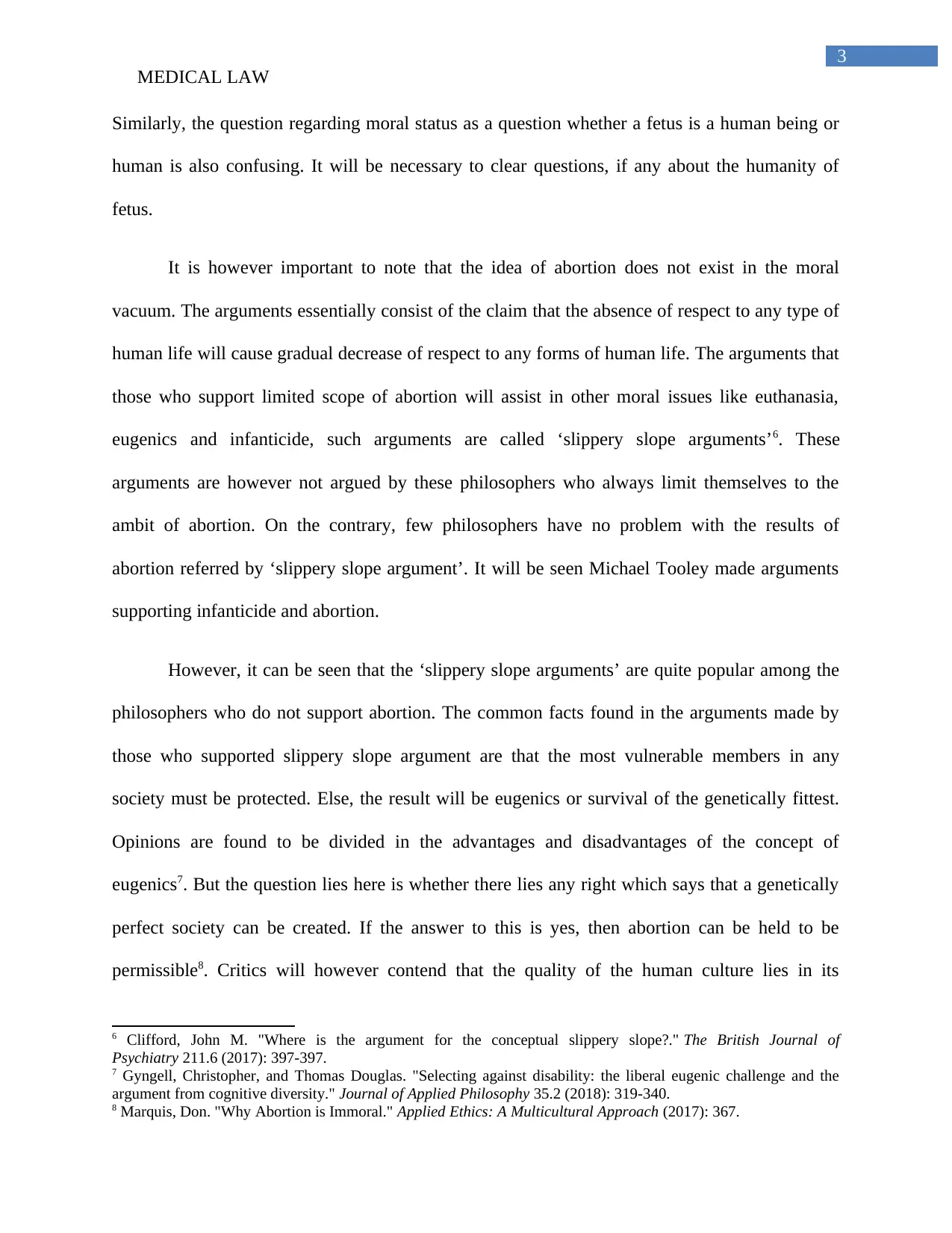
3
MEDICAL LAW
Similarly, the question regarding moral status as a question whether a fetus is a human being or
human is also confusing. It will be necessary to clear questions, if any about the humanity of
fetus.
It is however important to note that the idea of abortion does not exist in the moral
vacuum. The arguments essentially consist of the claim that the absence of respect to any type of
human life will cause gradual decrease of respect to any forms of human life. The arguments that
those who support limited scope of abortion will assist in other moral issues like euthanasia,
eugenics and infanticide, such arguments are called ‘slippery slope arguments’6. These
arguments are however not argued by these philosophers who always limit themselves to the
ambit of abortion. On the contrary, few philosophers have no problem with the results of
abortion referred by ‘slippery slope argument’. It will be seen Michael Tooley made arguments
supporting infanticide and abortion.
However, it can be seen that the ‘slippery slope arguments’ are quite popular among the
philosophers who do not support abortion. The common facts found in the arguments made by
those who supported slippery slope argument are that the most vulnerable members in any
society must be protected. Else, the result will be eugenics or survival of the genetically fittest.
Opinions are found to be divided in the advantages and disadvantages of the concept of
eugenics7. But the question lies here is whether there lies any right which says that a genetically
perfect society can be created. If the answer to this is yes, then abortion can be held to be
permissible8. Critics will however contend that the quality of the human culture lies in its
6 Clifford, John M. "Where is the argument for the conceptual slippery slope?." The British Journal of
Psychiatry 211.6 (2017): 397-397.
7 Gyngell, Christopher, and Thomas Douglas. "Selecting against disability: the liberal eugenic challenge and the
argument from cognitive diversity." Journal of Applied Philosophy 35.2 (2018): 319-340.
8 Marquis, Don. "Why Abortion is Immoral." Applied Ethics: A Multicultural Approach (2017): 367.
MEDICAL LAW
Similarly, the question regarding moral status as a question whether a fetus is a human being or
human is also confusing. It will be necessary to clear questions, if any about the humanity of
fetus.
It is however important to note that the idea of abortion does not exist in the moral
vacuum. The arguments essentially consist of the claim that the absence of respect to any type of
human life will cause gradual decrease of respect to any forms of human life. The arguments that
those who support limited scope of abortion will assist in other moral issues like euthanasia,
eugenics and infanticide, such arguments are called ‘slippery slope arguments’6. These
arguments are however not argued by these philosophers who always limit themselves to the
ambit of abortion. On the contrary, few philosophers have no problem with the results of
abortion referred by ‘slippery slope argument’. It will be seen Michael Tooley made arguments
supporting infanticide and abortion.
However, it can be seen that the ‘slippery slope arguments’ are quite popular among the
philosophers who do not support abortion. The common facts found in the arguments made by
those who supported slippery slope argument are that the most vulnerable members in any
society must be protected. Else, the result will be eugenics or survival of the genetically fittest.
Opinions are found to be divided in the advantages and disadvantages of the concept of
eugenics7. But the question lies here is whether there lies any right which says that a genetically
perfect society can be created. If the answer to this is yes, then abortion can be held to be
permissible8. Critics will however contend that the quality of the human culture lies in its
6 Clifford, John M. "Where is the argument for the conceptual slippery slope?." The British Journal of
Psychiatry 211.6 (2017): 397-397.
7 Gyngell, Christopher, and Thomas Douglas. "Selecting against disability: the liberal eugenic challenge and the
argument from cognitive diversity." Journal of Applied Philosophy 35.2 (2018): 319-340.
8 Marquis, Don. "Why Abortion is Immoral." Applied Ethics: A Multicultural Approach (2017): 367.
Paraphrase This Document
Need a fresh take? Get an instant paraphrase of this document with our AI Paraphraser
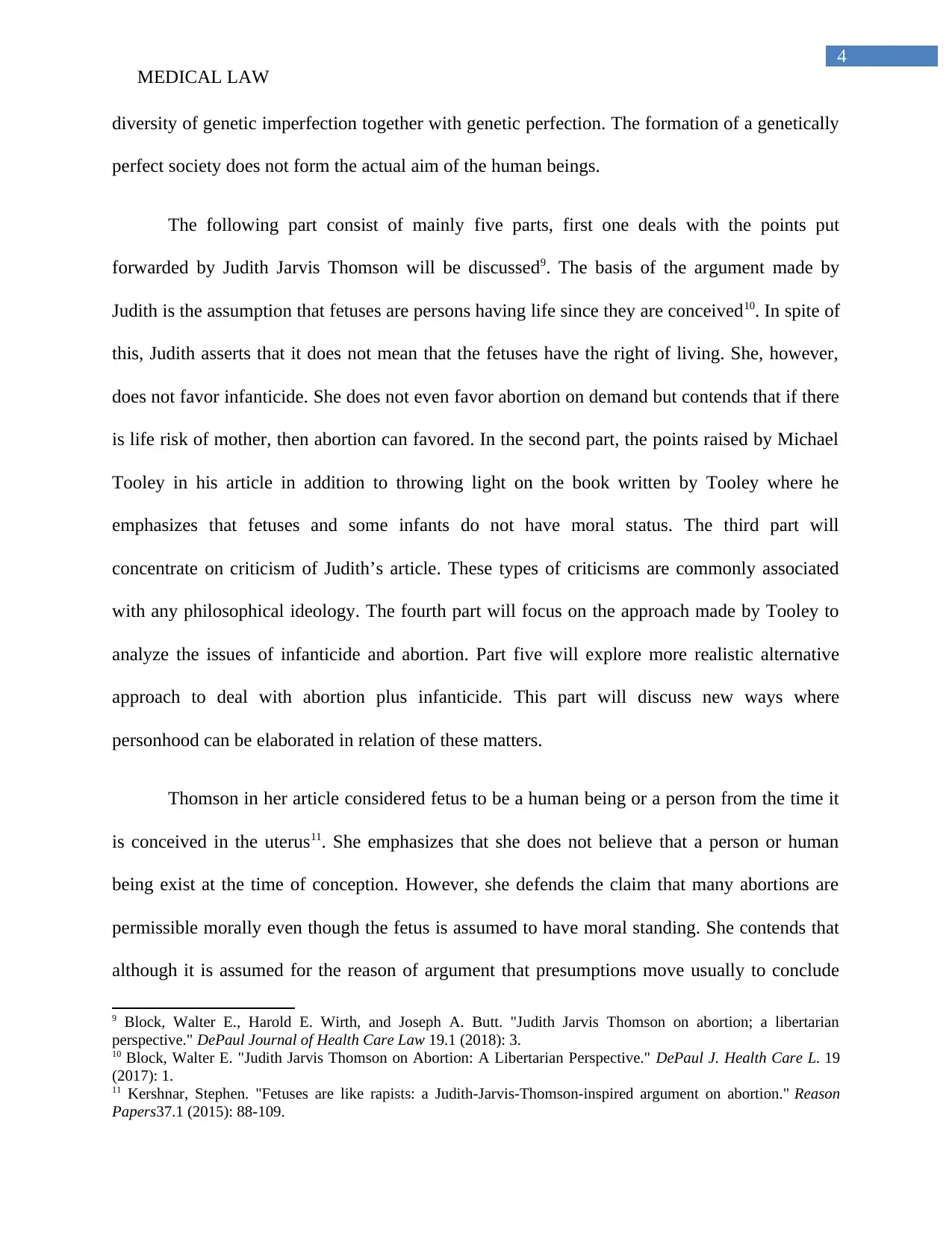
4
MEDICAL LAW
diversity of genetic imperfection together with genetic perfection. The formation of a genetically
perfect society does not form the actual aim of the human beings.
The following part consist of mainly five parts, first one deals with the points put
forwarded by Judith Jarvis Thomson will be discussed9. The basis of the argument made by
Judith is the assumption that fetuses are persons having life since they are conceived10. In spite of
this, Judith asserts that it does not mean that the fetuses have the right of living. She, however,
does not favor infanticide. She does not even favor abortion on demand but contends that if there
is life risk of mother, then abortion can favored. In the second part, the points raised by Michael
Tooley in his article in addition to throwing light on the book written by Tooley where he
emphasizes that fetuses and some infants do not have moral status. The third part will
concentrate on criticism of Judith’s article. These types of criticisms are commonly associated
with any philosophical ideology. The fourth part will focus on the approach made by Tooley to
analyze the issues of infanticide and abortion. Part five will explore more realistic alternative
approach to deal with abortion plus infanticide. This part will discuss new ways where
personhood can be elaborated in relation of these matters.
Thomson in her article considered fetus to be a human being or a person from the time it
is conceived in the uterus11. She emphasizes that she does not believe that a person or human
being exist at the time of conception. However, she defends the claim that many abortions are
permissible morally even though the fetus is assumed to have moral standing. She contends that
although it is assumed for the reason of argument that presumptions move usually to conclude
9 Block, Walter E., Harold E. Wirth, and Joseph A. Butt. "Judith Jarvis Thomson on abortion; a libertarian
perspective." DePaul Journal of Health Care Law 19.1 (2018): 3.
10 Block, Walter E. "Judith Jarvis Thomson on Abortion: A Libertarian Perspective." DePaul J. Health Care L. 19
(2017): 1.
11 Kershnar, Stephen. "Fetuses are like rapists: a Judith-Jarvis-Thomson-inspired argument on abortion." Reason
Papers37.1 (2015): 88-109.
MEDICAL LAW
diversity of genetic imperfection together with genetic perfection. The formation of a genetically
perfect society does not form the actual aim of the human beings.
The following part consist of mainly five parts, first one deals with the points put
forwarded by Judith Jarvis Thomson will be discussed9. The basis of the argument made by
Judith is the assumption that fetuses are persons having life since they are conceived10. In spite of
this, Judith asserts that it does not mean that the fetuses have the right of living. She, however,
does not favor infanticide. She does not even favor abortion on demand but contends that if there
is life risk of mother, then abortion can favored. In the second part, the points raised by Michael
Tooley in his article in addition to throwing light on the book written by Tooley where he
emphasizes that fetuses and some infants do not have moral status. The third part will
concentrate on criticism of Judith’s article. These types of criticisms are commonly associated
with any philosophical ideology. The fourth part will focus on the approach made by Tooley to
analyze the issues of infanticide and abortion. Part five will explore more realistic alternative
approach to deal with abortion plus infanticide. This part will discuss new ways where
personhood can be elaborated in relation of these matters.
Thomson in her article considered fetus to be a human being or a person from the time it
is conceived in the uterus11. She emphasizes that she does not believe that a person or human
being exist at the time of conception. However, she defends the claim that many abortions are
permissible morally even though the fetus is assumed to have moral standing. She contends that
although it is assumed for the reason of argument that presumptions move usually to conclude
9 Block, Walter E., Harold E. Wirth, and Joseph A. Butt. "Judith Jarvis Thomson on abortion; a libertarian
perspective." DePaul Journal of Health Care Law 19.1 (2018): 3.
10 Block, Walter E. "Judith Jarvis Thomson on Abortion: A Libertarian Perspective." DePaul J. Health Care L. 19
(2017): 1.
11 Kershnar, Stephen. "Fetuses are like rapists: a Judith-Jarvis-Thomson-inspired argument on abortion." Reason
Papers37.1 (2015): 88-109.
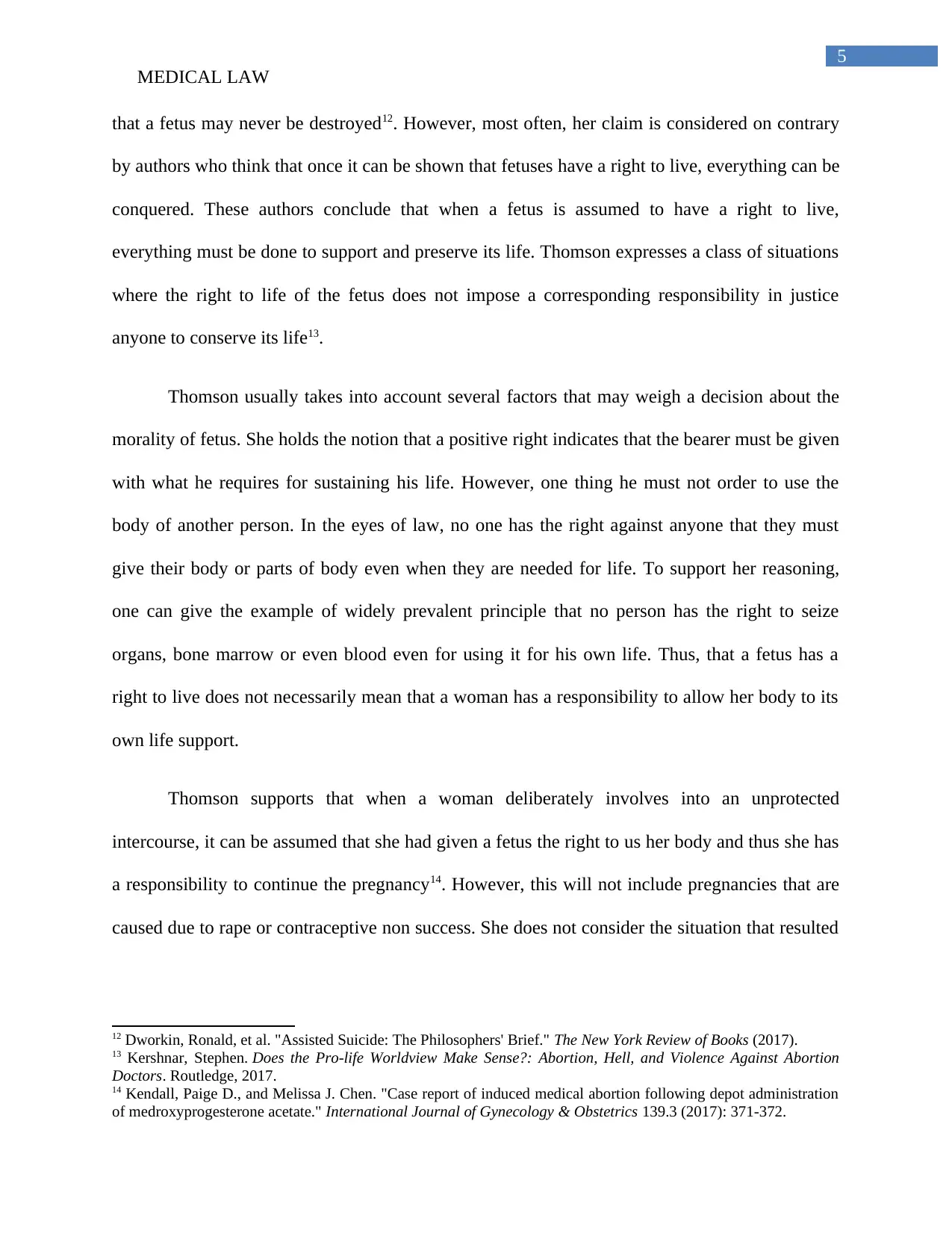
5
MEDICAL LAW
that a fetus may never be destroyed12. However, most often, her claim is considered on contrary
by authors who think that once it can be shown that fetuses have a right to live, everything can be
conquered. These authors conclude that when a fetus is assumed to have a right to live,
everything must be done to support and preserve its life. Thomson expresses a class of situations
where the right to life of the fetus does not impose a corresponding responsibility in justice
anyone to conserve its life13.
Thomson usually takes into account several factors that may weigh a decision about the
morality of fetus. She holds the notion that a positive right indicates that the bearer must be given
with what he requires for sustaining his life. However, one thing he must not order to use the
body of another person. In the eyes of law, no one has the right against anyone that they must
give their body or parts of body even when they are needed for life. To support her reasoning,
one can give the example of widely prevalent principle that no person has the right to seize
organs, bone marrow or even blood even for using it for his own life. Thus, that a fetus has a
right to live does not necessarily mean that a woman has a responsibility to allow her body to its
own life support.
Thomson supports that when a woman deliberately involves into an unprotected
intercourse, it can be assumed that she had given a fetus the right to us her body and thus she has
a responsibility to continue the pregnancy14. However, this will not include pregnancies that are
caused due to rape or contraceptive non success. She does not consider the situation that resulted
12 Dworkin, Ronald, et al. "Assisted Suicide: The Philosophers' Brief." The New York Review of Books (2017).
13 Kershnar, Stephen. Does the Pro-life Worldview Make Sense?: Abortion, Hell, and Violence Against Abortion
Doctors. Routledge, 2017.
14 Kendall, Paige D., and Melissa J. Chen. "Case report of induced medical abortion following depot administration
of medroxyprogesterone acetate." International Journal of Gynecology & Obstetrics 139.3 (2017): 371-372.
MEDICAL LAW
that a fetus may never be destroyed12. However, most often, her claim is considered on contrary
by authors who think that once it can be shown that fetuses have a right to live, everything can be
conquered. These authors conclude that when a fetus is assumed to have a right to live,
everything must be done to support and preserve its life. Thomson expresses a class of situations
where the right to life of the fetus does not impose a corresponding responsibility in justice
anyone to conserve its life13.
Thomson usually takes into account several factors that may weigh a decision about the
morality of fetus. She holds the notion that a positive right indicates that the bearer must be given
with what he requires for sustaining his life. However, one thing he must not order to use the
body of another person. In the eyes of law, no one has the right against anyone that they must
give their body or parts of body even when they are needed for life. To support her reasoning,
one can give the example of widely prevalent principle that no person has the right to seize
organs, bone marrow or even blood even for using it for his own life. Thus, that a fetus has a
right to live does not necessarily mean that a woman has a responsibility to allow her body to its
own life support.
Thomson supports that when a woman deliberately involves into an unprotected
intercourse, it can be assumed that she had given a fetus the right to us her body and thus she has
a responsibility to continue the pregnancy14. However, this will not include pregnancies that are
caused due to rape or contraceptive non success. She does not consider the situation that resulted
12 Dworkin, Ronald, et al. "Assisted Suicide: The Philosophers' Brief." The New York Review of Books (2017).
13 Kershnar, Stephen. Does the Pro-life Worldview Make Sense?: Abortion, Hell, and Violence Against Abortion
Doctors. Routledge, 2017.
14 Kendall, Paige D., and Melissa J. Chen. "Case report of induced medical abortion following depot administration
of medroxyprogesterone acetate." International Journal of Gynecology & Obstetrics 139.3 (2017): 371-372.
⊘ This is a preview!⊘
Do you want full access?
Subscribe today to unlock all pages.

Trusted by 1+ million students worldwide
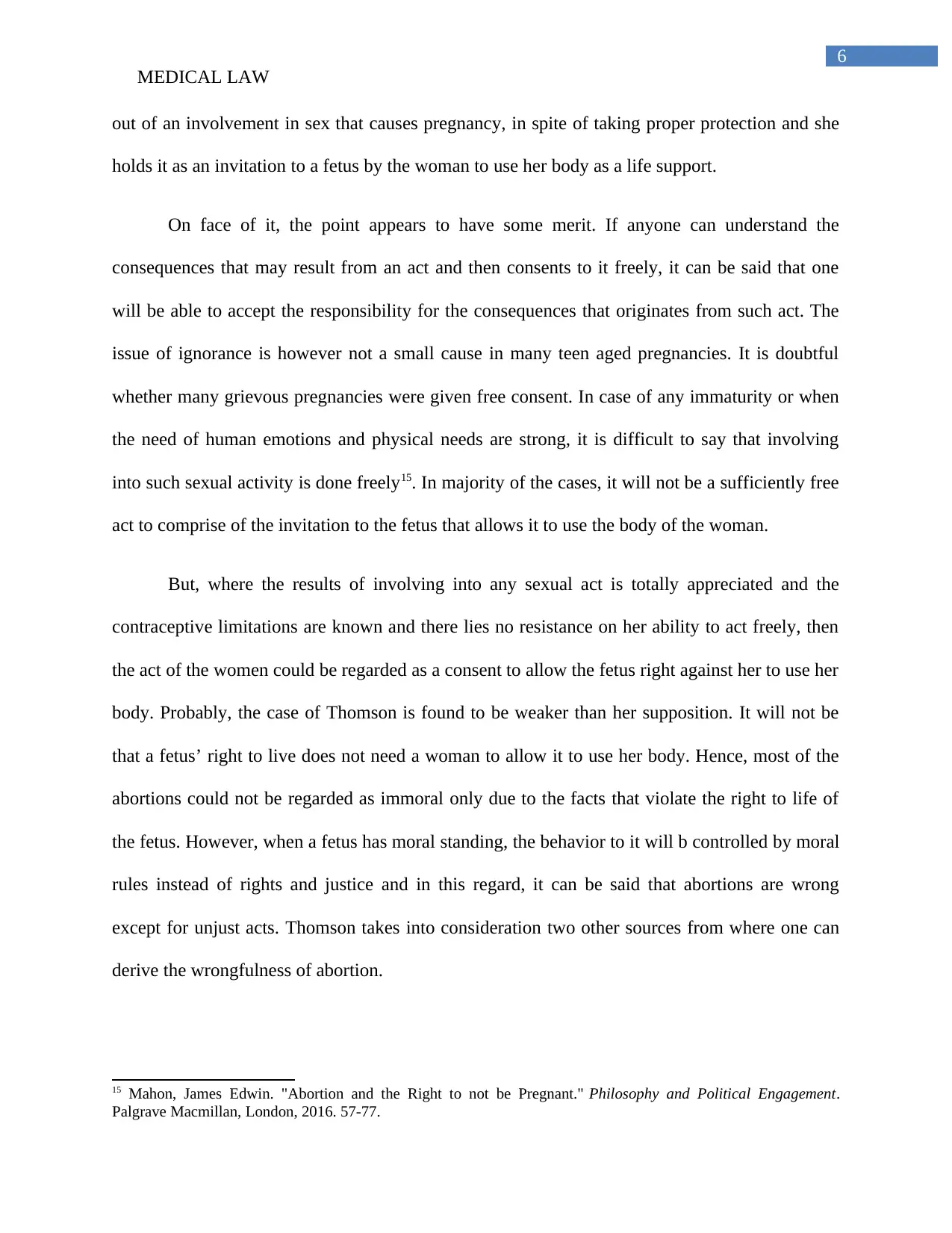
6
MEDICAL LAW
out of an involvement in sex that causes pregnancy, in spite of taking proper protection and she
holds it as an invitation to a fetus by the woman to use her body as a life support.
On face of it, the point appears to have some merit. If anyone can understand the
consequences that may result from an act and then consents to it freely, it can be said that one
will be able to accept the responsibility for the consequences that originates from such act. The
issue of ignorance is however not a small cause in many teen aged pregnancies. It is doubtful
whether many grievous pregnancies were given free consent. In case of any immaturity or when
the need of human emotions and physical needs are strong, it is difficult to say that involving
into such sexual activity is done freely15. In majority of the cases, it will not be a sufficiently free
act to comprise of the invitation to the fetus that allows it to use the body of the woman.
But, where the results of involving into any sexual act is totally appreciated and the
contraceptive limitations are known and there lies no resistance on her ability to act freely, then
the act of the women could be regarded as a consent to allow the fetus right against her to use her
body. Probably, the case of Thomson is found to be weaker than her supposition. It will not be
that a fetus’ right to live does not need a woman to allow it to use her body. Hence, most of the
abortions could not be regarded as immoral only due to the facts that violate the right to life of
the fetus. However, when a fetus has moral standing, the behavior to it will b controlled by moral
rules instead of rights and justice and in this regard, it can be said that abortions are wrong
except for unjust acts. Thomson takes into consideration two other sources from where one can
derive the wrongfulness of abortion.
15 Mahon, James Edwin. "Abortion and the Right to not be Pregnant." Philosophy and Political Engagement.
Palgrave Macmillan, London, 2016. 57-77.
MEDICAL LAW
out of an involvement in sex that causes pregnancy, in spite of taking proper protection and she
holds it as an invitation to a fetus by the woman to use her body as a life support.
On face of it, the point appears to have some merit. If anyone can understand the
consequences that may result from an act and then consents to it freely, it can be said that one
will be able to accept the responsibility for the consequences that originates from such act. The
issue of ignorance is however not a small cause in many teen aged pregnancies. It is doubtful
whether many grievous pregnancies were given free consent. In case of any immaturity or when
the need of human emotions and physical needs are strong, it is difficult to say that involving
into such sexual activity is done freely15. In majority of the cases, it will not be a sufficiently free
act to comprise of the invitation to the fetus that allows it to use the body of the woman.
But, where the results of involving into any sexual act is totally appreciated and the
contraceptive limitations are known and there lies no resistance on her ability to act freely, then
the act of the women could be regarded as a consent to allow the fetus right against her to use her
body. Probably, the case of Thomson is found to be weaker than her supposition. It will not be
that a fetus’ right to live does not need a woman to allow it to use her body. Hence, most of the
abortions could not be regarded as immoral only due to the facts that violate the right to life of
the fetus. However, when a fetus has moral standing, the behavior to it will b controlled by moral
rules instead of rights and justice and in this regard, it can be said that abortions are wrong
except for unjust acts. Thomson takes into consideration two other sources from where one can
derive the wrongfulness of abortion.
15 Mahon, James Edwin. "Abortion and the Right to not be Pregnant." Philosophy and Political Engagement.
Palgrave Macmillan, London, 2016. 57-77.
Paraphrase This Document
Need a fresh take? Get an instant paraphrase of this document with our AI Paraphraser
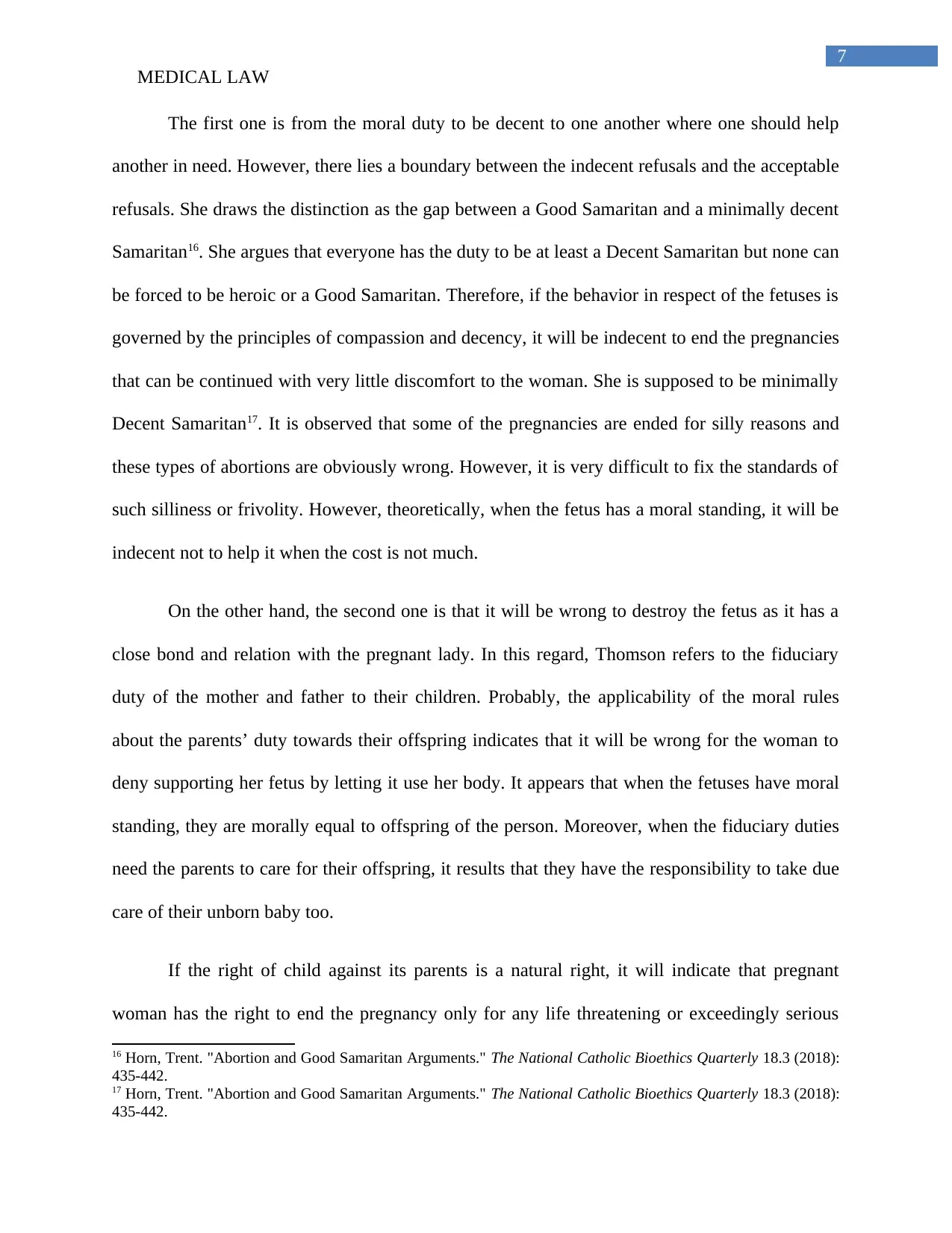
7
MEDICAL LAW
The first one is from the moral duty to be decent to one another where one should help
another in need. However, there lies a boundary between the indecent refusals and the acceptable
refusals. She draws the distinction as the gap between a Good Samaritan and a minimally decent
Samaritan16. She argues that everyone has the duty to be at least a Decent Samaritan but none can
be forced to be heroic or a Good Samaritan. Therefore, if the behavior in respect of the fetuses is
governed by the principles of compassion and decency, it will be indecent to end the pregnancies
that can be continued with very little discomfort to the woman. She is supposed to be minimally
Decent Samaritan17. It is observed that some of the pregnancies are ended for silly reasons and
these types of abortions are obviously wrong. However, it is very difficult to fix the standards of
such silliness or frivolity. However, theoretically, when the fetus has a moral standing, it will be
indecent not to help it when the cost is not much.
On the other hand, the second one is that it will be wrong to destroy the fetus as it has a
close bond and relation with the pregnant lady. In this regard, Thomson refers to the fiduciary
duty of the mother and father to their children. Probably, the applicability of the moral rules
about the parents’ duty towards their offspring indicates that it will be wrong for the woman to
deny supporting her fetus by letting it use her body. It appears that when the fetuses have moral
standing, they are morally equal to offspring of the person. Moreover, when the fiduciary duties
need the parents to care for their offspring, it results that they have the responsibility to take due
care of their unborn baby too.
If the right of child against its parents is a natural right, it will indicate that pregnant
woman has the right to end the pregnancy only for any life threatening or exceedingly serious
16 Horn, Trent. "Abortion and Good Samaritan Arguments." The National Catholic Bioethics Quarterly 18.3 (2018):
435-442.
17 Horn, Trent. "Abortion and Good Samaritan Arguments." The National Catholic Bioethics Quarterly 18.3 (2018):
435-442.
MEDICAL LAW
The first one is from the moral duty to be decent to one another where one should help
another in need. However, there lies a boundary between the indecent refusals and the acceptable
refusals. She draws the distinction as the gap between a Good Samaritan and a minimally decent
Samaritan16. She argues that everyone has the duty to be at least a Decent Samaritan but none can
be forced to be heroic or a Good Samaritan. Therefore, if the behavior in respect of the fetuses is
governed by the principles of compassion and decency, it will be indecent to end the pregnancies
that can be continued with very little discomfort to the woman. She is supposed to be minimally
Decent Samaritan17. It is observed that some of the pregnancies are ended for silly reasons and
these types of abortions are obviously wrong. However, it is very difficult to fix the standards of
such silliness or frivolity. However, theoretically, when the fetus has a moral standing, it will be
indecent not to help it when the cost is not much.
On the other hand, the second one is that it will be wrong to destroy the fetus as it has a
close bond and relation with the pregnant lady. In this regard, Thomson refers to the fiduciary
duty of the mother and father to their children. Probably, the applicability of the moral rules
about the parents’ duty towards their offspring indicates that it will be wrong for the woman to
deny supporting her fetus by letting it use her body. It appears that when the fetuses have moral
standing, they are morally equal to offspring of the person. Moreover, when the fiduciary duties
need the parents to care for their offspring, it results that they have the responsibility to take due
care of their unborn baby too.
If the right of child against its parents is a natural right, it will indicate that pregnant
woman has the right to end the pregnancy only for any life threatening or exceedingly serious
16 Horn, Trent. "Abortion and Good Samaritan Arguments." The National Catholic Bioethics Quarterly 18.3 (2018):
435-442.
17 Horn, Trent. "Abortion and Good Samaritan Arguments." The National Catholic Bioethics Quarterly 18.3 (2018):
435-442.
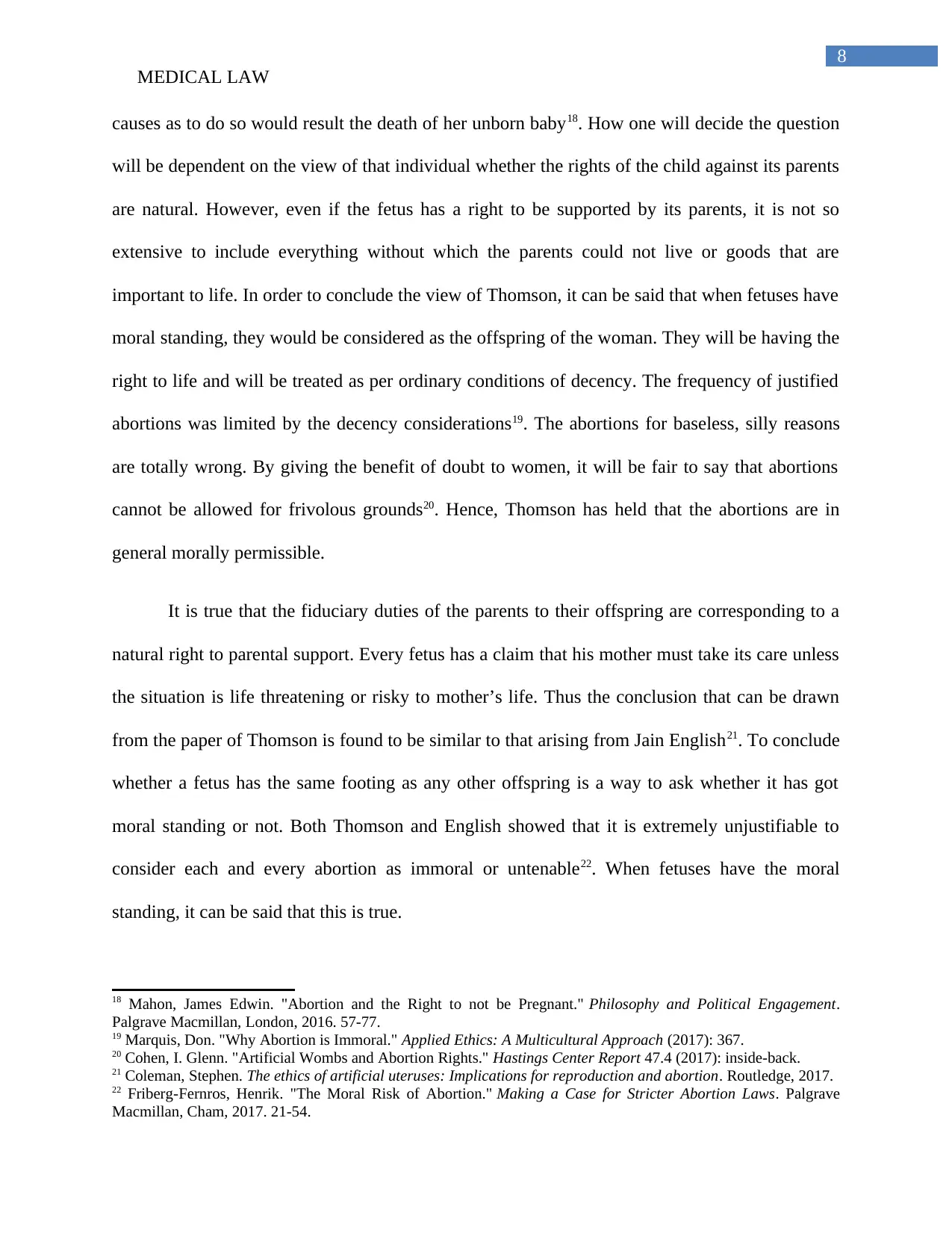
8
MEDICAL LAW
causes as to do so would result the death of her unborn baby18. How one will decide the question
will be dependent on the view of that individual whether the rights of the child against its parents
are natural. However, even if the fetus has a right to be supported by its parents, it is not so
extensive to include everything without which the parents could not live or goods that are
important to life. In order to conclude the view of Thomson, it can be said that when fetuses have
moral standing, they would be considered as the offspring of the woman. They will be having the
right to life and will be treated as per ordinary conditions of decency. The frequency of justified
abortions was limited by the decency considerations19. The abortions for baseless, silly reasons
are totally wrong. By giving the benefit of doubt to women, it will be fair to say that abortions
cannot be allowed for frivolous grounds20. Hence, Thomson has held that the abortions are in
general morally permissible.
It is true that the fiduciary duties of the parents to their offspring are corresponding to a
natural right to parental support. Every fetus has a claim that his mother must take its care unless
the situation is life threatening or risky to mother’s life. Thus the conclusion that can be drawn
from the paper of Thomson is found to be similar to that arising from Jain English21. To conclude
whether a fetus has the same footing as any other offspring is a way to ask whether it has got
moral standing or not. Both Thomson and English showed that it is extremely unjustifiable to
consider each and every abortion as immoral or untenable22. When fetuses have the moral
standing, it can be said that this is true.
18 Mahon, James Edwin. "Abortion and the Right to not be Pregnant." Philosophy and Political Engagement.
Palgrave Macmillan, London, 2016. 57-77.
19 Marquis, Don. "Why Abortion is Immoral." Applied Ethics: A Multicultural Approach (2017): 367.
20 Cohen, I. Glenn. "Artificial Wombs and Abortion Rights." Hastings Center Report 47.4 (2017): inside-back.
21 Coleman, Stephen. The ethics of artificial uteruses: Implications for reproduction and abortion. Routledge, 2017.
22 Friberg-Fernros, Henrik. "The Moral Risk of Abortion." Making a Case for Stricter Abortion Laws. Palgrave
Macmillan, Cham, 2017. 21-54.
MEDICAL LAW
causes as to do so would result the death of her unborn baby18. How one will decide the question
will be dependent on the view of that individual whether the rights of the child against its parents
are natural. However, even if the fetus has a right to be supported by its parents, it is not so
extensive to include everything without which the parents could not live or goods that are
important to life. In order to conclude the view of Thomson, it can be said that when fetuses have
moral standing, they would be considered as the offspring of the woman. They will be having the
right to life and will be treated as per ordinary conditions of decency. The frequency of justified
abortions was limited by the decency considerations19. The abortions for baseless, silly reasons
are totally wrong. By giving the benefit of doubt to women, it will be fair to say that abortions
cannot be allowed for frivolous grounds20. Hence, Thomson has held that the abortions are in
general morally permissible.
It is true that the fiduciary duties of the parents to their offspring are corresponding to a
natural right to parental support. Every fetus has a claim that his mother must take its care unless
the situation is life threatening or risky to mother’s life. Thus the conclusion that can be drawn
from the paper of Thomson is found to be similar to that arising from Jain English21. To conclude
whether a fetus has the same footing as any other offspring is a way to ask whether it has got
moral standing or not. Both Thomson and English showed that it is extremely unjustifiable to
consider each and every abortion as immoral or untenable22. When fetuses have the moral
standing, it can be said that this is true.
18 Mahon, James Edwin. "Abortion and the Right to not be Pregnant." Philosophy and Political Engagement.
Palgrave Macmillan, London, 2016. 57-77.
19 Marquis, Don. "Why Abortion is Immoral." Applied Ethics: A Multicultural Approach (2017): 367.
20 Cohen, I. Glenn. "Artificial Wombs and Abortion Rights." Hastings Center Report 47.4 (2017): inside-back.
21 Coleman, Stephen. The ethics of artificial uteruses: Implications for reproduction and abortion. Routledge, 2017.
22 Friberg-Fernros, Henrik. "The Moral Risk of Abortion." Making a Case for Stricter Abortion Laws. Palgrave
Macmillan, Cham, 2017. 21-54.
⊘ This is a preview!⊘
Do you want full access?
Subscribe today to unlock all pages.

Trusted by 1+ million students worldwide
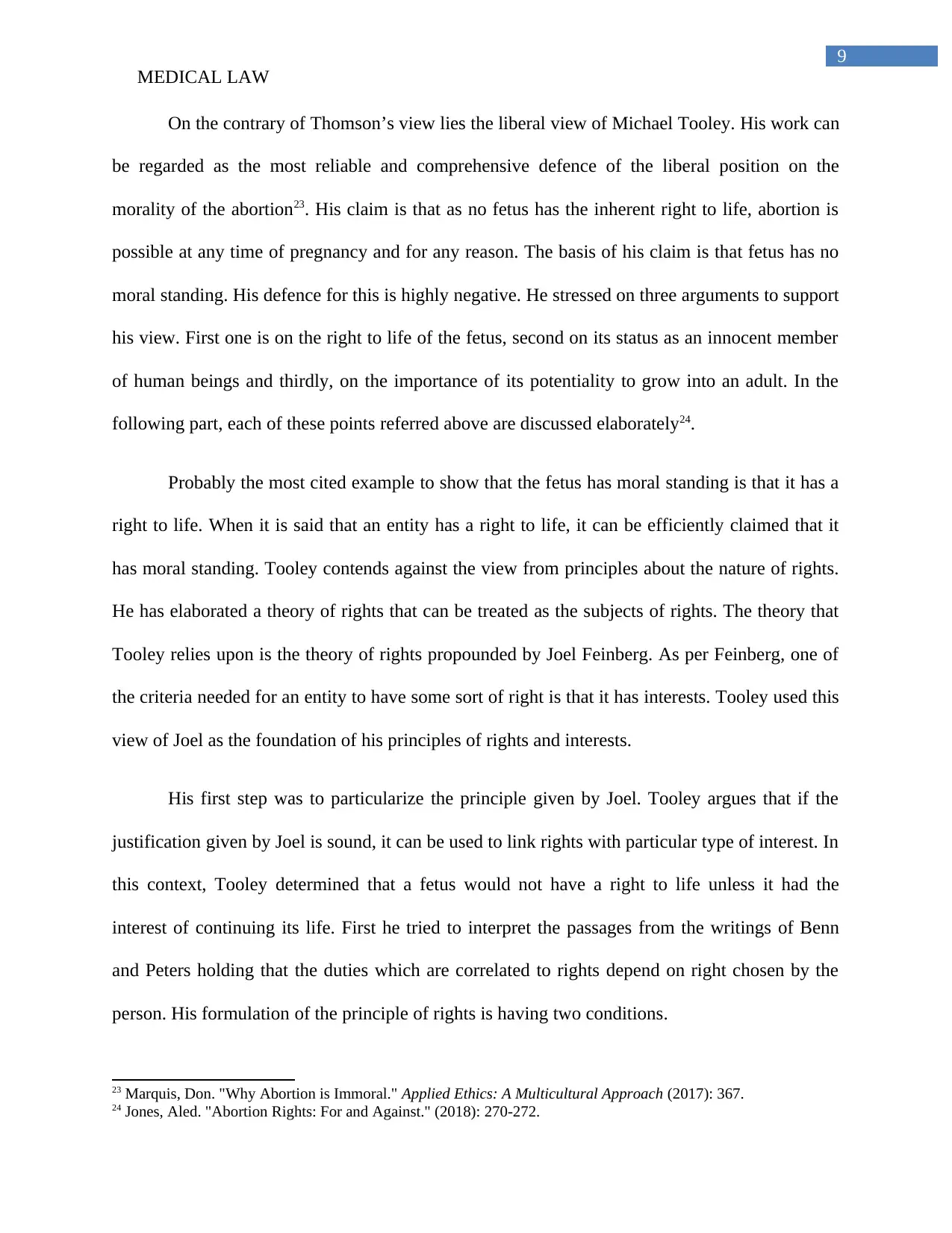
9
MEDICAL LAW
On the contrary of Thomson’s view lies the liberal view of Michael Tooley. His work can
be regarded as the most reliable and comprehensive defence of the liberal position on the
morality of the abortion23. His claim is that as no fetus has the inherent right to life, abortion is
possible at any time of pregnancy and for any reason. The basis of his claim is that fetus has no
moral standing. His defence for this is highly negative. He stressed on three arguments to support
his view. First one is on the right to life of the fetus, second on its status as an innocent member
of human beings and thirdly, on the importance of its potentiality to grow into an adult. In the
following part, each of these points referred above are discussed elaborately24.
Probably the most cited example to show that the fetus has moral standing is that it has a
right to life. When it is said that an entity has a right to life, it can be efficiently claimed that it
has moral standing. Tooley contends against the view from principles about the nature of rights.
He has elaborated a theory of rights that can be treated as the subjects of rights. The theory that
Tooley relies upon is the theory of rights propounded by Joel Feinberg. As per Feinberg, one of
the criteria needed for an entity to have some sort of right is that it has interests. Tooley used this
view of Joel as the foundation of his principles of rights and interests.
His first step was to particularize the principle given by Joel. Tooley argues that if the
justification given by Joel is sound, it can be used to link rights with particular type of interest. In
this context, Tooley determined that a fetus would not have a right to life unless it had the
interest of continuing its life. First he tried to interpret the passages from the writings of Benn
and Peters holding that the duties which are correlated to rights depend on right chosen by the
person. His formulation of the principle of rights is having two conditions.
23 Marquis, Don. "Why Abortion is Immoral." Applied Ethics: A Multicultural Approach (2017): 367.
24 Jones, Aled. "Abortion Rights: For and Against." (2018): 270-272.
MEDICAL LAW
On the contrary of Thomson’s view lies the liberal view of Michael Tooley. His work can
be regarded as the most reliable and comprehensive defence of the liberal position on the
morality of the abortion23. His claim is that as no fetus has the inherent right to life, abortion is
possible at any time of pregnancy and for any reason. The basis of his claim is that fetus has no
moral standing. His defence for this is highly negative. He stressed on three arguments to support
his view. First one is on the right to life of the fetus, second on its status as an innocent member
of human beings and thirdly, on the importance of its potentiality to grow into an adult. In the
following part, each of these points referred above are discussed elaborately24.
Probably the most cited example to show that the fetus has moral standing is that it has a
right to life. When it is said that an entity has a right to life, it can be efficiently claimed that it
has moral standing. Tooley contends against the view from principles about the nature of rights.
He has elaborated a theory of rights that can be treated as the subjects of rights. The theory that
Tooley relies upon is the theory of rights propounded by Joel Feinberg. As per Feinberg, one of
the criteria needed for an entity to have some sort of right is that it has interests. Tooley used this
view of Joel as the foundation of his principles of rights and interests.
His first step was to particularize the principle given by Joel. Tooley argues that if the
justification given by Joel is sound, it can be used to link rights with particular type of interest. In
this context, Tooley determined that a fetus would not have a right to life unless it had the
interest of continuing its life. First he tried to interpret the passages from the writings of Benn
and Peters holding that the duties which are correlated to rights depend on right chosen by the
person. His formulation of the principle of rights is having two conditions.
23 Marquis, Don. "Why Abortion is Immoral." Applied Ethics: A Multicultural Approach (2017): 367.
24 Jones, Aled. "Abortion Rights: For and Against." (2018): 270-272.
Paraphrase This Document
Need a fresh take? Get an instant paraphrase of this document with our AI Paraphraser
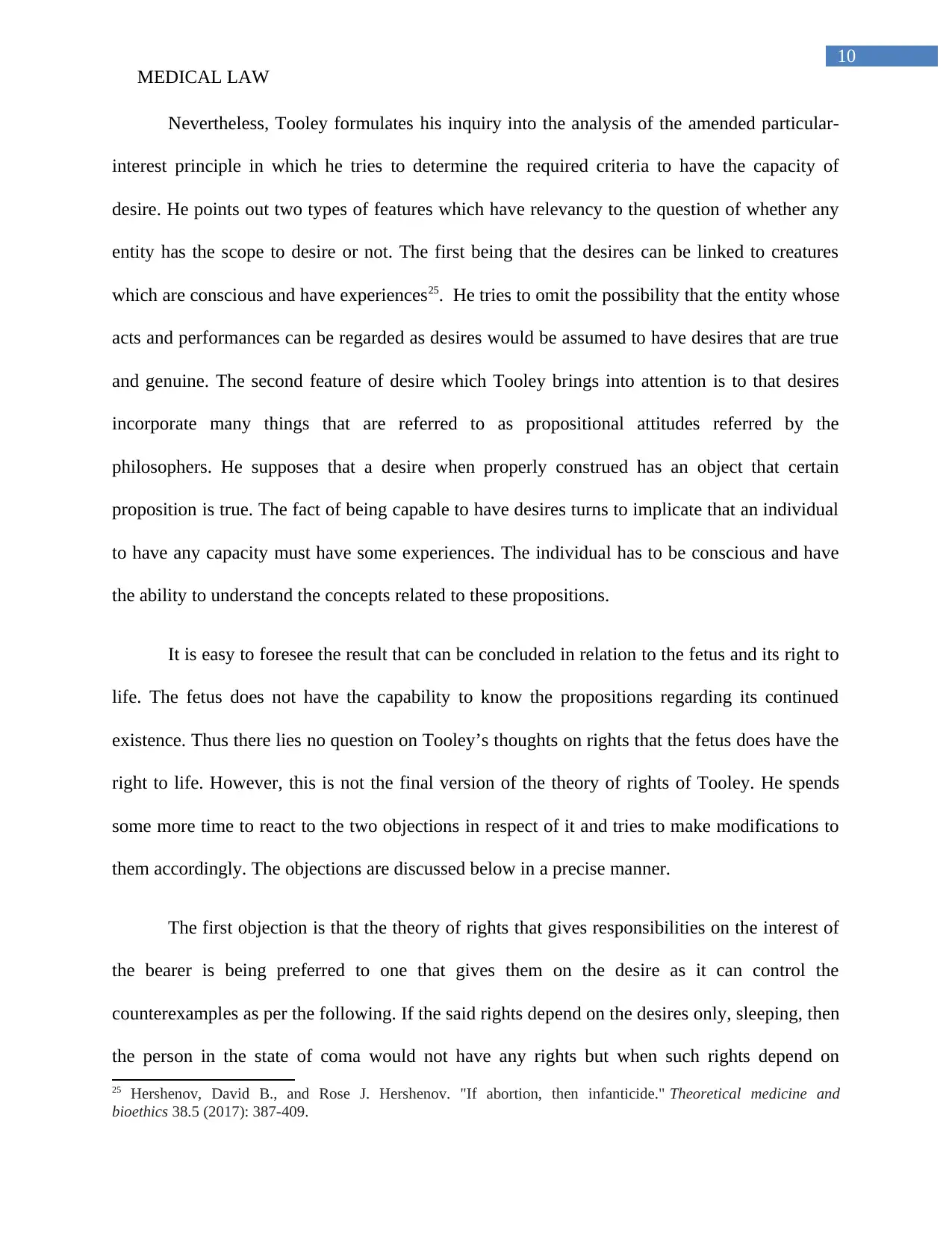
10
MEDICAL LAW
Nevertheless, Tooley formulates his inquiry into the analysis of the amended particular-
interest principle in which he tries to determine the required criteria to have the capacity of
desire. He points out two types of features which have relevancy to the question of whether any
entity has the scope to desire or not. The first being that the desires can be linked to creatures
which are conscious and have experiences25. He tries to omit the possibility that the entity whose
acts and performances can be regarded as desires would be assumed to have desires that are true
and genuine. The second feature of desire which Tooley brings into attention is to that desires
incorporate many things that are referred to as propositional attitudes referred by the
philosophers. He supposes that a desire when properly construed has an object that certain
proposition is true. The fact of being capable to have desires turns to implicate that an individual
to have any capacity must have some experiences. The individual has to be conscious and have
the ability to understand the concepts related to these propositions.
It is easy to foresee the result that can be concluded in relation to the fetus and its right to
life. The fetus does not have the capability to know the propositions regarding its continued
existence. Thus there lies no question on Tooley’s thoughts on rights that the fetus does have the
right to life. However, this is not the final version of the theory of rights of Tooley. He spends
some more time to react to the two objections in respect of it and tries to make modifications to
them accordingly. The objections are discussed below in a precise manner.
The first objection is that the theory of rights that gives responsibilities on the interest of
the bearer is being preferred to one that gives them on the desire as it can control the
counterexamples as per the following. If the said rights depend on the desires only, sleeping, then
the person in the state of coma would not have any rights but when such rights depend on
25 Hershenov, David B., and Rose J. Hershenov. "If abortion, then infanticide." Theoretical medicine and
bioethics 38.5 (2017): 387-409.
MEDICAL LAW
Nevertheless, Tooley formulates his inquiry into the analysis of the amended particular-
interest principle in which he tries to determine the required criteria to have the capacity of
desire. He points out two types of features which have relevancy to the question of whether any
entity has the scope to desire or not. The first being that the desires can be linked to creatures
which are conscious and have experiences25. He tries to omit the possibility that the entity whose
acts and performances can be regarded as desires would be assumed to have desires that are true
and genuine. The second feature of desire which Tooley brings into attention is to that desires
incorporate many things that are referred to as propositional attitudes referred by the
philosophers. He supposes that a desire when properly construed has an object that certain
proposition is true. The fact of being capable to have desires turns to implicate that an individual
to have any capacity must have some experiences. The individual has to be conscious and have
the ability to understand the concepts related to these propositions.
It is easy to foresee the result that can be concluded in relation to the fetus and its right to
life. The fetus does not have the capability to know the propositions regarding its continued
existence. Thus there lies no question on Tooley’s thoughts on rights that the fetus does have the
right to life. However, this is not the final version of the theory of rights of Tooley. He spends
some more time to react to the two objections in respect of it and tries to make modifications to
them accordingly. The objections are discussed below in a precise manner.
The first objection is that the theory of rights that gives responsibilities on the interest of
the bearer is being preferred to one that gives them on the desire as it can control the
counterexamples as per the following. If the said rights depend on the desires only, sleeping, then
the person in the state of coma would not have any rights but when such rights depend on
25 Hershenov, David B., and Rose J. Hershenov. "If abortion, then infanticide." Theoretical medicine and
bioethics 38.5 (2017): 387-409.
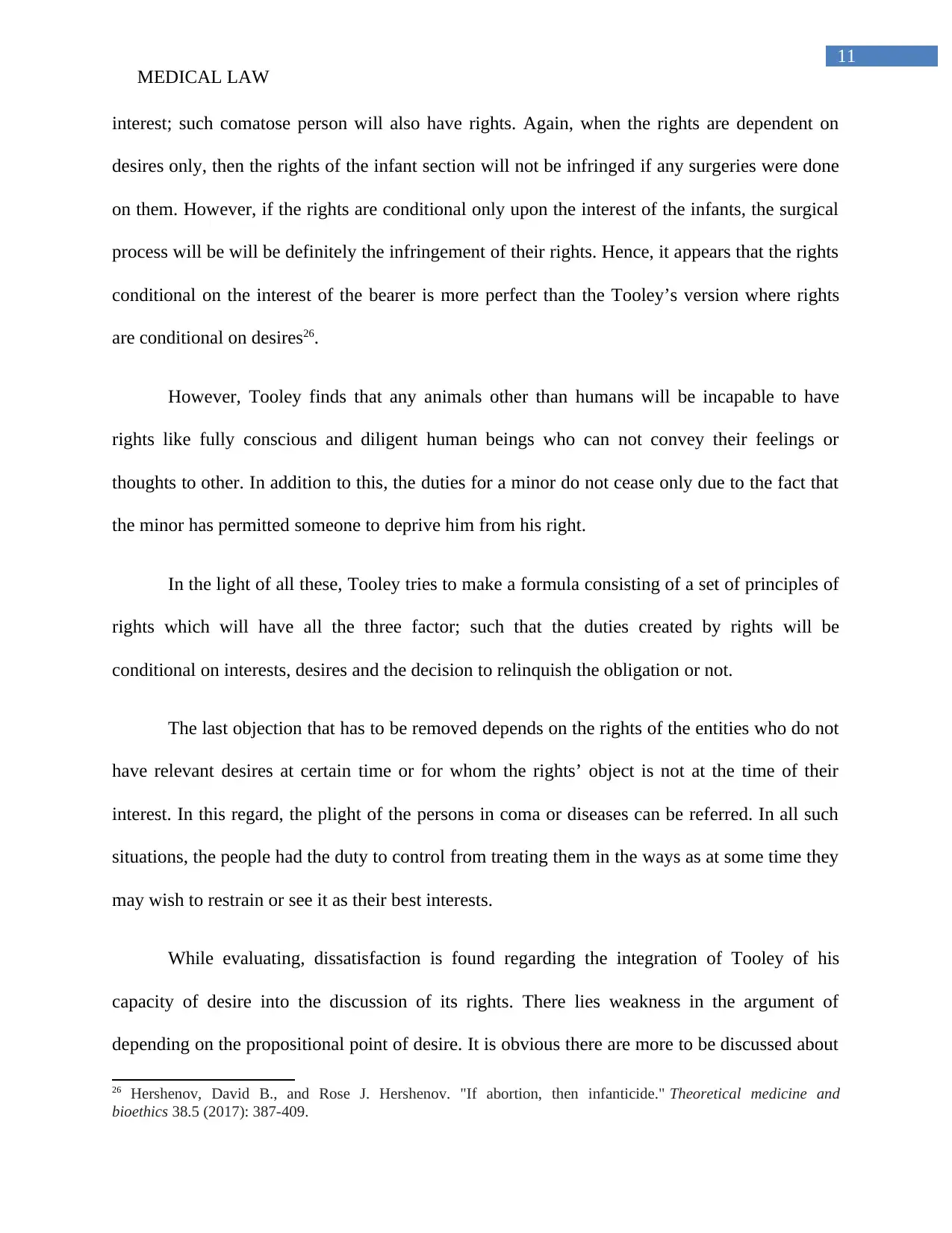
11
MEDICAL LAW
interest; such comatose person will also have rights. Again, when the rights are dependent on
desires only, then the rights of the infant section will not be infringed if any surgeries were done
on them. However, if the rights are conditional only upon the interest of the infants, the surgical
process will be will be definitely the infringement of their rights. Hence, it appears that the rights
conditional on the interest of the bearer is more perfect than the Tooley’s version where rights
are conditional on desires26.
However, Tooley finds that any animals other than humans will be incapable to have
rights like fully conscious and diligent human beings who can not convey their feelings or
thoughts to other. In addition to this, the duties for a minor do not cease only due to the fact that
the minor has permitted someone to deprive him from his right.
In the light of all these, Tooley tries to make a formula consisting of a set of principles of
rights which will have all the three factor; such that the duties created by rights will be
conditional on interests, desires and the decision to relinquish the obligation or not.
The last objection that has to be removed depends on the rights of the entities who do not
have relevant desires at certain time or for whom the rights’ object is not at the time of their
interest. In this regard, the plight of the persons in coma or diseases can be referred. In all such
situations, the people had the duty to control from treating them in the ways as at some time they
may wish to restrain or see it as their best interests.
While evaluating, dissatisfaction is found regarding the integration of Tooley of his
capacity of desire into the discussion of its rights. There lies weakness in the argument of
depending on the propositional point of desire. It is obvious there are more to be discussed about
26 Hershenov, David B., and Rose J. Hershenov. "If abortion, then infanticide." Theoretical medicine and
bioethics 38.5 (2017): 387-409.
MEDICAL LAW
interest; such comatose person will also have rights. Again, when the rights are dependent on
desires only, then the rights of the infant section will not be infringed if any surgeries were done
on them. However, if the rights are conditional only upon the interest of the infants, the surgical
process will be will be definitely the infringement of their rights. Hence, it appears that the rights
conditional on the interest of the bearer is more perfect than the Tooley’s version where rights
are conditional on desires26.
However, Tooley finds that any animals other than humans will be incapable to have
rights like fully conscious and diligent human beings who can not convey their feelings or
thoughts to other. In addition to this, the duties for a minor do not cease only due to the fact that
the minor has permitted someone to deprive him from his right.
In the light of all these, Tooley tries to make a formula consisting of a set of principles of
rights which will have all the three factor; such that the duties created by rights will be
conditional on interests, desires and the decision to relinquish the obligation or not.
The last objection that has to be removed depends on the rights of the entities who do not
have relevant desires at certain time or for whom the rights’ object is not at the time of their
interest. In this regard, the plight of the persons in coma or diseases can be referred. In all such
situations, the people had the duty to control from treating them in the ways as at some time they
may wish to restrain or see it as their best interests.
While evaluating, dissatisfaction is found regarding the integration of Tooley of his
capacity of desire into the discussion of its rights. There lies weakness in the argument of
depending on the propositional point of desire. It is obvious there are more to be discussed about
26 Hershenov, David B., and Rose J. Hershenov. "If abortion, then infanticide." Theoretical medicine and
bioethics 38.5 (2017): 387-409.
⊘ This is a preview!⊘
Do you want full access?
Subscribe today to unlock all pages.

Trusted by 1+ million students worldwide
1 out of 26
Related Documents
Your All-in-One AI-Powered Toolkit for Academic Success.
+13062052269
info@desklib.com
Available 24*7 on WhatsApp / Email
![[object Object]](/_next/static/media/star-bottom.7253800d.svg)
Unlock your academic potential
Copyright © 2020–2026 A2Z Services. All Rights Reserved. Developed and managed by ZUCOL.




